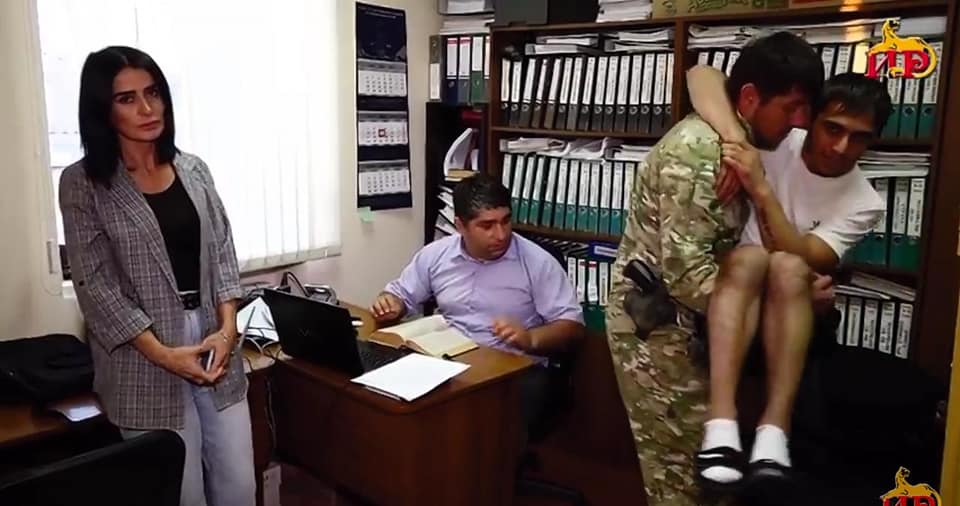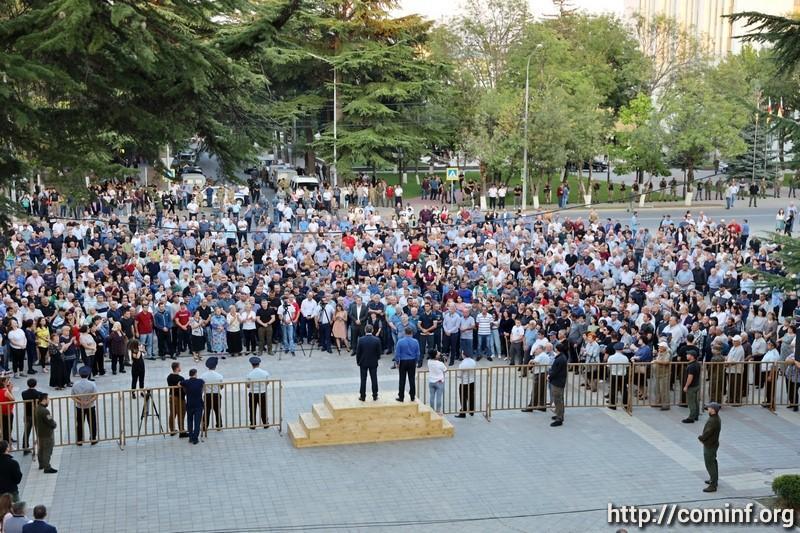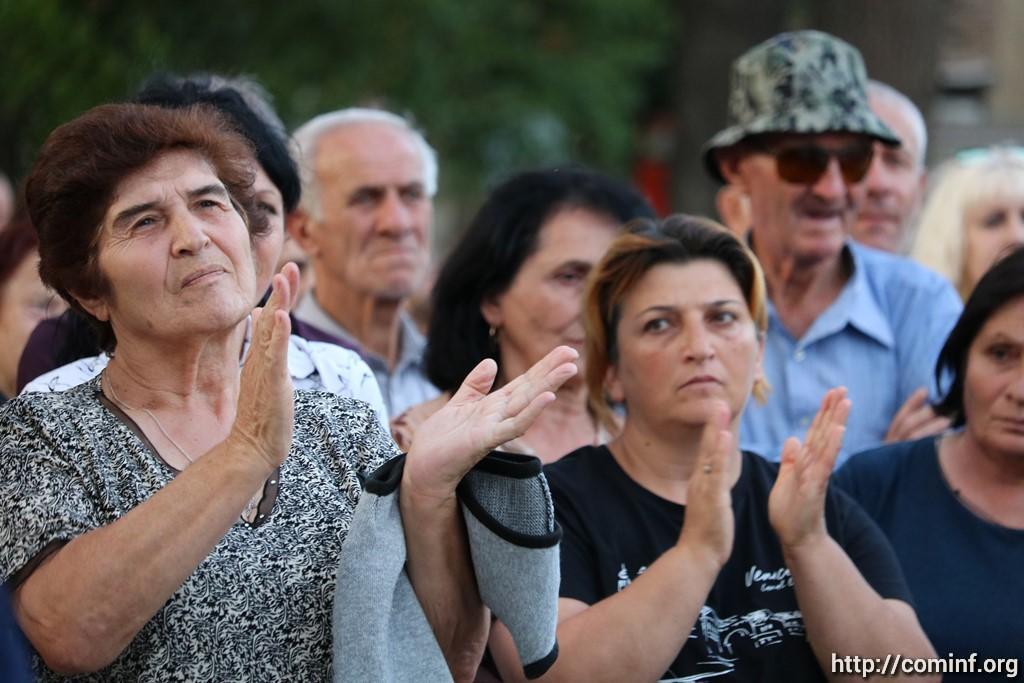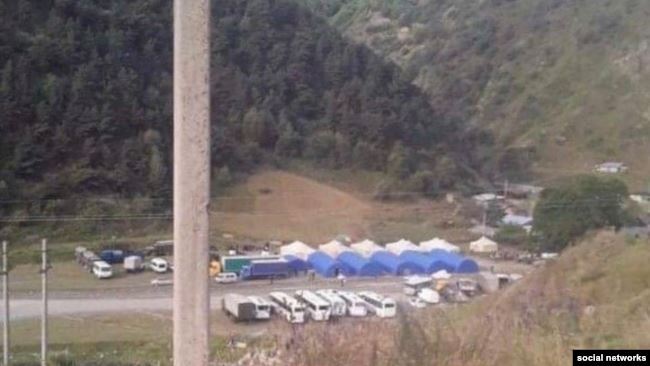No change in South Ossetia – president, supported by Moscow, plans to stay
South Ossetian President Anatoly Bibilov does not plan to step down, despite the protesters who have been demanding he resign in the last few days following the death of 28-year-old Inal Dzhabiev. Moscow has expressed its indirect support for him.
Meanwhile, in South Ossetia, doctors are trying to save another alleged victim of police brutality: a young man who, after being detained, is unable to walk.
28-year-old resident of South Ossetia allegedly tortured to death in a detention center
Protesters in South Ossetia demand the president and his administration resign after the death of Inal Dzhabiev, presumably from torture. The president promises a full investigation.
The tragedy of Dzhabiev’s story is continued in the case of Nikolai Tskhovrebov, who was arrested at the same time that he was.
The appeal written by his lawyers to the prosecutor general states that Tskhovrebov was detained by law enforcement agencies on August 23 in connection to the attempted assassination of the minister of internal affairs, and was beaten and tortured along with Dzhabiev for five days, until August 28.

Tskhovrebov was beaten severely and is unable to walk, having most likely sustained a spinal injury. For the entire time that he was in the hospital under guard, neither his relatives nor other visitors were allowed to see him.
After his case was made public, on the evening of September 4, he was released from the hospital to his family, but only for the weekend.
And on September 5, it became known that President Anatoly Bibilov met with Tskhovrebov’s mother and promised that after consulting with doctors, he would be sent to Russia for treatment.
Rally in support of the president
Despite the protests, as well as fresh cases of police brutality, President Anatoly Bibilov is clearly not planning to take political responsibility for the situation.
On September 4, members of the current administration and their supporters gathered in the square where the protesters had been demonstrating for several days. Bibilov spoke to them and said that all those responsible for Dzhabiev’s death would be punished.
He expressed his condolences to the family of the deceased, but noted that “some are trying to twist this tragedy into a political situation”.
“It is human nature to make mistakes, but let everyone answer before the law, and do not give ultimatums to the president. I was elected by the people and when the time comes to elect a new president, he will also be elected by the people”, Bibilov said.

• Op-ed: S. Ossetia protests – punishing the guilty isn’t enough. The system has to be changed
• South Ossetia: customs regs giving rise to food and goods crisis
Inal Dzhabiev, 28, died on August 28, allegedly as a result of torture after being arrested on charges of attacking Interior Minister Igor Naniev.
After a protest broke out, President Bibilov removed the minister of internal affairs from his post, and then dismissed the rest of the administration, and several people were detained in this case.
However, protesters and opposition members are demanding the resignation of the president and the prosecutor general, accusing them of covering up the violence committed against detainees and prisoners.

Opposition reactions
“I watched the president’s speech at today’s rally. As you might expect, the majority of it was him being concerned over losing his position. Apparently, this is now the most pressing issue and the only subject of concern for Anatoly Bibilov”, said leader of the Nykhas party, MP David Sanakoev, in reaction to Bibilov’s speech.
Sanakoev noted that the president did not say a word about the role played by the prosecutor general and the head of the ministry of internal affairs in this tragedy.
He says that Prosecutor General Uruzmag Dzhagaev is the main obstacle to a fair investigation of the incident, since he and Interior Minister Igor Naniev covered up prison beatings and refused to provide the parliament with the materials they requested.
Opposition MPs have refused to participate in legislative decisions until the attorney general is dismissed.
At the same time, the President of South Ossetia proposed creating a temporary parliamentary commission to investigate the death of Dzhabiev.
Sanakoev published a new document on the Dzhabiev case – an official response to an inquiry by the Tskhinvali City Court. The document states that the court did not rule on the arrest of either Dzhabiev or Tskhovrebov. Which means that their imprisonment was illegal.
Russia’s reaction
Deputy Secretary of the Russian Security Council Rashid Nurgaliev was the first Russian official to publicly respond to the unrest in South Ossetia.
Russian news agencies report that Nurgaliev discussed the situation in the republic with President of South Ossetia Anatoly Bibilov on September 4.
“We are working over the internet(on the situation in South Ossetia) <…>. Today I spoke with the President, the situation is under control”, Nurgaliyev told reporters.
He did not exclude the possibility that he would personally visit South Ossetia and investigate the situation himself once the borders open.
“The most important thing is that the president is in control of the situation, and that everything is resolved using mechanisms that already work, not shouting and outbursts of emotion”, said Nurgaliev.
At the same time, social media users in South Ossetia have recently been sharing photos from the customs border post in Nizhny Zaramag on the border of Russia and South Ossetia, where security units, presumably the Russian Guard, are clearly visible”, reports a correspondent from Echo of the Caucasus.

This immediately gave rise to suspicions that the redeployment of Russian units could somehow be related to the situation in the republic.
The terms, place names, opinions and ideas expressed in this publication do not necessarily coincide with the opinions and ideas of JAMnews or its individual employees. JAMnews reserves the right to remove comments on posts that are considered offensive, threatening, violent, or otherwise ethically unacceptable.



















